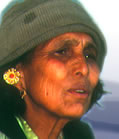THEMES IN THIS
TESTIMONY
Employment and Income

Water

Click on arrows
to find more
testimonies
featuring
these themes
|
|
Sex
|
male
|
|
|
Age
|
62
|
|
|
Identity
|
N
|
|
|
Occupation
|
|
|
|
Location
|
Melamchi, Sindhupalchok
|
|
|
Date
|
1998
|
|
summary
This is one of the water testimonies of which we do not have a full transcript. It is the interviewer’s edited version of the testimony and does not include any questions top the narrator.
The narrator has followed in his father’s footsteps and operates a water mill in the village: “As a small boy, I enjoyed following my father to this place.” He explains how fewer people use the mill now: “Earlier on, some days up to 20-25 people came here. This number has gone down considerably since numerous motor-driven mills were installed in the area. These mills are ten times faster than our grinding mill.”
He describes the construction of a stone water mill but also the intensive labour required to run it: channelling the water, monitoring the grain and managing the force of the water. Despite this he continues to run the mill “because it is said that a son must follow in the footsteps of the father”. Although these days people from any caste own and operate mills, he explains: “In the old days, since Majhis lived near rivers it seemed as if it was the vocation of only the Majhis.”
Some people have quit their water mill, but the narrator’s family depends on the earnings from their mill to supplement their harvest from their small terraced fields. He admits it that it is not as profitable as other work might be and for this reason he is not sure if his own son will continue to work the mill after he has gone.
detailed breakdown
|
You will need a password from Panos to view the full
transcript of the interview. To apply for a password, click here.
Once you have a password, click here to go to the beginning
of the transcript. You can also click on any section of the
breakdown of content below and go straight to the
corresponding part of the transcript.
|
| Section 1 |
He looks after the stone mill that before him was his father’s
Fewer people use it now with the availability of faster mills.
Difficulties and fine details of working the mill. Mill receives the water which powers it on a rotation basis: “Work in the mill is backbreaking. And, after all that, people often divert your canal somewhere else. Your labour is lost. This results in quarrels leading, often, to physical brawls. The strong win.”
|
| Section 2 |
Flour quality is dependant on the force of the water flow.
The mill is shared between five, and produce from small terraced fields is limited, “Working on the farm is tough. It is a lot of hard work, but there is very little crop to harvest. Running the water mill is not easy either. It is only because it is said that a son must follow in the footsteps of the father; it isn't easy to run a mill. After all, everyone aspires to pursue the family trade. That's all.”
Many other mills have been abandoned. “In our case, we just can't afford to leave.” It would be more profitable to do other work, he says, “We are somehow bumbling and stumbling along.”
Taxes must be paid on the mill
|
| Section 3 |
Not sure whether his son will keep the mill or not. “After I am gone he can do as he pleases.” |
|


